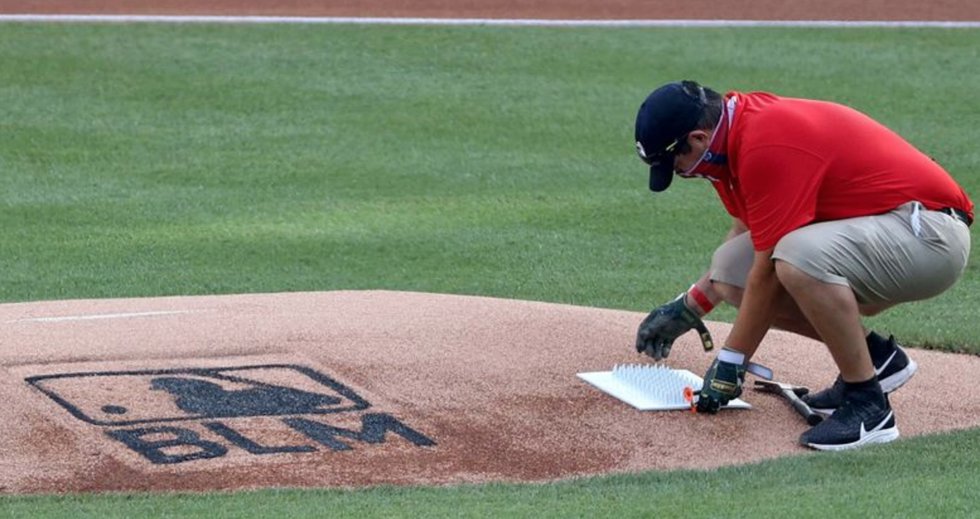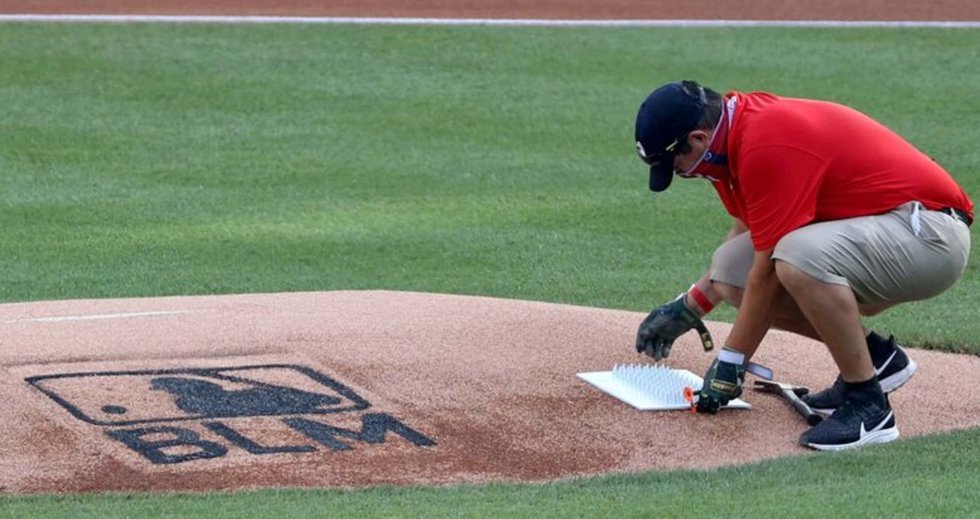
The grand old sport known as “America’s National Pastime” has experienced a lot of trouble in recent decades, from threats of strikes to real-time player protests to the deeper sense that baseball has slipped down more than a few notches.
But baseball has had its heretics since the nineteenth century. And two new books offer a rich mixture of individual heroism, collective protest and organizing—along with the inevitable “stats,” without which no baseball volume would seem acceptable to fan-readers.
The players’ own response to the murder of George Floyd in 2020 prompted more Black participation and opportunity in every corner of baseball, including management.
Democratic socialist Peter Dreier, professor at Occidental College, is the indispensable collaborator on both volumes with Robert Elias, a professor of politics at the University of San Francisco.
Baseball Rebels: the Players, People and Social Movements that Shook up the Game and Changed America (University of Nebraska) hits me square in the nostalgia zone. I have a vague memory of reading somewhere about there being a cooperative players’ league at the end of the nineteenth century, as a budding socialist, but I did not know what to make of it at the time.
The book explores the short-lived but more egalitarian and markedly less racist Mexican League of the 1940s. This is where a favorite of Willie Mays fans like me might naturally take interest in fellow Giants star, pitcher Sal Maglie, who disappeared and then reappeared in Giants uniform over a period of years.
Dreier and Elias pin it down, along with much else: a large handful of players, too good to purge from the majors, took their chances in rebelling and usually lost. From the New Deal through the 1940s, the Popular Front and the Daily Worker added muscle to the struggle against racial exclusion, and arguably forced the issue, while a few owners were happy to share the benefits.
Many pages are devoted to Jackie Robinson, and with good reason. He was, as they write, “the first athlete in post World War II America to use his celebrity as a platform to address social and political injustice, becoming an inspiration to subsequent activist athletes.” To say he faced humiliations and occasional danger to himself and his family by crossing the color line would be an understatement, as the 2013 biopic 42 (succeeding the 1950 Jackie Robinson Story) explained to newer generations.
Retiring from the field in 1956, Robinson took a job as an executive at the coffee maker Chock Full o’Nuts. He traveled extensively, giving talks, taking part in rallies and protests, assisting in fundraising for civil rights groups (actually becoming fundraising chair for the NAACP) and even writing a three-day-a-week newspaper column for the then-liberal New York Post.
As controversies around integration sizzled, he went public to demand Eisenhower send troops to Little Rock, Arkansas, to defend Black students integrating schools there. Robinson also later supported the Freedom Riders and even the highly controversial Student Nonviolent Coordinating Committee.
In 1948, Robinson was summoned before a Congressional investigating committee to testify against Paul Robeson, the musical giant and global activist on race and labor issues. He offered a minimal response but said that, if Robeson had suggested Black Americans should not fight in a war with Russia, then Robinson firmly disagreed. The Cold War press played this as though Robinson had launched an all-out attack against Robeson.
Robinson wavered politically in later decades, supporting Republican Nelson Rockefeller for President in the 1964 primaries, and later as much as cutting ties with Martin Luther King Jr., over King’s criticism of the War in Vietnam. Recovering himself, Robinson cheered Muhammad Ali’s courage in standing up for his principles and refusing the draft. Robinson went on, crucially, to support Curt Flood’s challenge in 1970 to the Reserve Clause (only two other retired players joined him in this support: Hank Greenberg and Jim Brosnan) as a form of involuntary servitude.
This brings the authors, if not directly, to the other of their greatest heroes: Curt Flood, known in his prime as baseball’s best center-fielder, was brave enough to join public protests against racism across the country to challenge past Supreme Court rulings on the reserve clause. The authors explain that the equally brave Roberto Clemente, joining the struggle, turned the tide.
The Players Association unanimously backed the lawsuit. And, though it was refused to be heard by the Supreme Court in 1972, the principle was realized in practice through negotiations in 1975. Thereafter, owners’ contracts with players could be renewed by themselves only once. Players were thus freed over time to negotiate with any other teams they chose.
Blacklisted from baseball itself, Flood died at age fifty-nine in 1997. The next year, another former player, Kentucky’s Republican Congressional representative Jim Bunning, got Congress to pass the Curt Flood Act, formally ending the Reserve Clause. Flood, like Robinson and a score of others, not even including the careers lost before the lines of segregation had broken down, had accomplished a great deal for players and fans alike.
Meanwhile, successful unionization had made a huge difference. The players’ leader most hated by management, Marvin Miller, even made his way into the Hall of Fame after many turn-downs by the conservative bunch that ran (and still run) that franchise. Baseball Rebels is notable for its tracing of the struggles to get others, including players from the Negro Leagues, admitted to the vaunted Hall, after many turn-downs.
The players’ own response to the murder of George Floyd in 2020 prompted more Black participation and opportunity in every corner of baseball, including management. As in the case of recognition of LGBTQ+ players, the tide has turned, albeit slowly. Likewise, we’re seeing the rise of women’s leagues, or rather, the return of women’s leagues, which enjoyed a bounce in the 1940s and sank afterwards. Readers will find much in this volume that a second or third reading will bring new delight and interest.
Major League Rebels: Baseball Battles Over Workers’ Rights and the American Empire (Rowman and Littlefield) charms in related ways, but others as well. The same writing pair here give us a clear political view of the quasi-class struggle, in part because the paternalist, patriarchal nature of ownership is seen so clearly. And the way the sport has been used to support militarization and wars seems painfully natural as the flyover of military aircraft to salute the World Series (or is it vice-versa?).
Elias and Dreier carefully describe the owners’ conniving with the State Department to victimized baseball players and fans South of the Border, punishing the Cubans and Nicaraguans. (Nearly two hundred Nicaraguan baseball players were ultimately murdered by the Contras.) Once more in Venezuela, the owners sought to smear another major baseball fan, Hugo Chavez, by shutting down the U.S.-funded league when it could not be used for U.S. propaganda.
The struggle goes on, as the authors describe the owners’ schemes to militarize the atmosphere at every opportunity—especially after 9/11—how they coerced cities to spend huge chunks of taxpayer money for stadiums created only to increase profits, how badly they continue to exploit players in the shrinking minor leagues, and how teams recruit young Latin American athletes with false promises, until a stop is put to this practice.
In response, there has been a push for better pay and working conditions for minor league players, so they get more out of their short time in the majors besides punishing injuries.
Nothing is ever finally won, as the “Foreword” by Bill Lee makes clear. He makes one more crucial point: only the fans can help the players to revive baseball, make it better, and possibly even return it to its status as “America’s National Pastime.”
Peter Dreier and Robert Elias, Baseball Rebels: the Players, People and Social Movements that Shook up the Game and Changed America. Foreword by Dave Zirin. Omaha: University of Nebraska Press. 367 pages. Publication date April 1, 2022.
Robert Elias the Peter Dreier, Major League Rebels: Baseball Battles Over Workers’ Rights and the American Empire. Introduction by Bill Lee. Lanham: Rowman and Littlefield. 334 pages. Publication date April 13, 2022.

Felecia Phillips Ollie DD (h.c.) is the inspiring leader and founder of The Equality Network LLC (TEN). With a background in coaching, travel, and a career in news, Felecia brings a unique perspective to promoting diversity and inclusion. Holding a Bachelor’s Degree in English/Communications, she is passionate about creating a more inclusive future. From graduating from Mississippi Valley State University to leading initiatives like the Washington State Department of Ecology’s Equal Employment Opportunity Program, Felecia is dedicated to making a positive impact. Join her journey on our blog as she shares insights and leads the charge for equity through The Equality Network.




